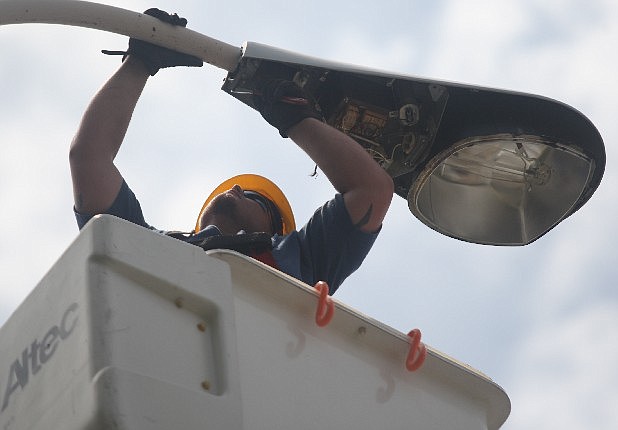Auditors differ over EPB's streetlight bills
Thursday, July 24, 2014
A pair of audits released Tuesday did little to banish the confusion and contention surrounding EPB's streetlight bills, which stem from what city auditor Stan Sewell called "systemic problems" in the way such costs are calculated by Chattanooga's electric utility.
Even after seven weeks of work by two teams of trained and certified accountants, city officials appeared to be no closer Tuesday to learning whether the utility underbilled or overbilled taxpayers.
EPB's hired auditors, Mauldin & Jenkins, found that the utility has actually underbilled city taxpayers by $686,000 over seven years. But Sewell says EPB has overbilled by $619,000 over the last three years.
"Stan Sewell was responding to a request from the City Council, and Mauldin & Jenkins were responding to a request from the mayor that had another set of parameters," said Harold DePriest, president and CEO of EPB. "Two different requests, two different directives. The reports don't clash, they're coming from two different perspectives."
One point upon which both sets of auditors agreed was that the utility's streetlight billing system is based on a foundation of flawed power usage estimates, thousands of miscounted lights and mistakes in how TVA's rules are applied.
As EPB's auditor wrote, "the Electric Power Board of Chattanooga's processes for streetlight billings are complex and involve many components."
The process is so complex, in fact, that the City Council halted discussion on the differing reports Tuesday, giving members five weeks to ask further questions of EPB and Sewell and digest the complex audits that attempt to explain how streetlight billing works.
For many years, the utility didn't keep close track when old lights were taken down and replaced with newer lights, leading to more than 4,000 streetlights that were improperly classified as power-hungry mercury vapor lights instead of the newer and more efficient high-pressure sodium lights. EPB contends that even if the city was charged higher energy costs for the more inefficient older lights, those charges were more than offset by the underbilling for the newer and more expensive lights installed by EPB.
Even if EPB had been billing the city for the correct lights, there's still no perfect way to precisely calculate how long a given light actually burns each night, since the streetlights don't have electric meters like a house or business. Instead, officials use a spreadsheet to multiply the wattage of each light by the estimated hours of darkness, without knowing whether lights are actually on, off, or if they even exist.
For instance, more than 150 lights weren't just misclassified, they were nowhere to be found, according to one report.
This type of billing is widespread throughout the industry. Like most electric utilities, EPB's streetlight billing is based on the assumption that its list of lights is up to date. However, that turned out not to be the case in Chattanooga, Sewell found.
"During our work we found some of the estimates, assumptions and allocations were not current or were not accurate or were supported by minimal documentation," he said. "In addition, we noted portions of the system did not function consistently, as it was designed to. We also noted substantial transactional errors."
One of the parties hardest hit by these errors was not EPB, but onetime Chattanooga success story Global Green Lighting. The company founded by UTC graduate Don Lepard was at one time contracted to replace the city's EPB-managed lighting portfolio with "smart" LED lights that are individually metered and can be controlled from a central commend hub.
But Mayor Andy Berke backed away from a Global Green Lighting contract extension amid reports from EPB that cast doubt on the financial case for Lepard's lights. Lepard attended the City Council hearing Tuesday, but did not comment on the advice of his attorney.
Both Berke and members of the City Council expressed dismay over the differing conclusions from Sewell and Maulden & Jenkins about what the city owes EPB for street lights.
"At the end of the day I'm a bottom-line person, and at the end of the day, we're not there yet," said Councilman Russell Gilbert. "I hope we get there soon."
Berke released a letter to EPB's board announcing a plan to resolve the discrepancies between the two dueling reports, and promised to put in place a process to ensure billings are "accurate and transparent going forward."
"It is critically important to citizens and ratepayers to have confidence in EPB's billings," wrote Berke.
DePriest, who was not afforded the chance to speak before the City Council on Tuesday, said he expected to reach an agreement of sort with the city before the next council discussion.
"We're going to keep banging out heads on this, keep working until both sides are in agreement, and we're going to have to design into that a sensible and easier way to analyze our lights," DePriest said.
"I think a lot will get done in the next five weeks," said Joe Ferguson, chairman of the board.
Contact staff writer Ellis Smith at 423-757-6315 or esmith@timesfreepress.com with tips and documents.
Previous news report:

